-
 Bitcoin
Bitcoin $113900
-1.39% -
 Ethereum
Ethereum $3517
-4.15% -
 XRP
XRP $3.009
1.59% -
 Tether USDt
Tether USDt $0.9997
-0.04% -
 BNB
BNB $766.8
-1.41% -
 Solana
Solana $164.6
-2.38% -
 USDC
USDC $0.9998
-0.02% -
 TRON
TRON $0.3277
0.65% -
 Dogecoin
Dogecoin $0.2023
-1.67% -
 Cardano
Cardano $0.7246
0.05% -
 Hyperliquid
Hyperliquid $38.27
-4.77% -
 Sui
Sui $3.528
-0.52% -
 Stellar
Stellar $0.3890
-0.73% -
 Chainlink
Chainlink $16.16
-2.69% -
 Bitcoin Cash
Bitcoin Cash $539.9
-4.38% -
 Hedera
Hedera $0.2425
-2.00% -
 Avalanche
Avalanche $21.71
-0.97% -
 Toncoin
Toncoin $3.662
5.73% -
 Ethena USDe
Ethena USDe $1.000
-0.02% -
 UNUS SED LEO
UNUS SED LEO $8.964
0.35% -
 Litecoin
Litecoin $107.7
2.33% -
 Shiba Inu
Shiba Inu $0.00001223
-0.40% -
 Polkadot
Polkadot $3.617
-0.97% -
 Uniswap
Uniswap $9.052
-2.49% -
 Monero
Monero $295.1
-3.79% -
 Dai
Dai $0.9999
0.00% -
 Bitget Token
Bitget Token $4.315
-1.85% -
 Pepe
Pepe $0.00001060
0.11% -
 Cronos
Cronos $0.1342
-2.72% -
 Aave
Aave $256.0
-0.87%
How can Chinese investors buy Bitcoin ETFs through FDI?
Chinese investors face significant hurdles in accessing Bitcoin ETFs due to China's strict crypto regulations, but FDI offers complex potential pathways.
Apr 03, 2025 at 05:56 pm
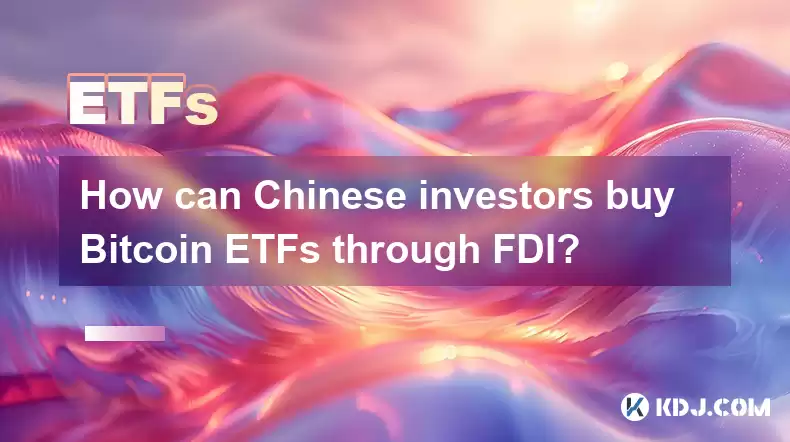
Understanding the Challenges and Pathways
Chinese investors face unique hurdles in accessing Bitcoin ETFs due to regulatory restrictions within China. Direct investment in cryptocurrencies, including Bitcoin, is largely prohibited. Foreign Direct Investment (FDI) offers a potential, albeit complex, route around these restrictions. However, it's crucial to understand the limitations and legal complexities involved. This article explores the potential pathways and associated challenges.
What are Bitcoin ETFs and FDI?
Bitcoin ETFs (Exchange-Traded Funds) are investment vehicles that track the price of Bitcoin. They offer a regulated and convenient way to gain exposure to the cryptocurrency market. FDI, or Foreign Direct Investment, refers to investments made by a company or individual in a foreign country to gain control or influence over an existing business or to create a new one. In this context, it might involve using FDI channels to indirectly access Bitcoin ETF investments available in other jurisdictions.
Potential Pathways for Chinese Investors
There are several theoretical routes, though all carry significant legal and practical hurdles:
Investing in foreign companies holding Bitcoin ETFs: A Chinese investor could invest in a foreign company (through FDI channels) that holds a substantial portfolio of Bitcoin ETFs. This provides indirect exposure, but requires navigating complex international investment laws and regulations. This method is subject to the complexities of international taxation and reporting.
Establishing an offshore entity: Setting up a company in a jurisdiction with favorable cryptocurrency regulations (like Singapore or Switzerland) allows for direct investment in Bitcoin ETFs. However, this necessitates navigating complex legal processes, including compliance with both Chinese and foreign regulations regarding capital outflow and tax obligations. This route involves significant legal and financial expertise.
Using qualified intermediaries: Employing financial intermediaries specializing in international investments and cryptocurrency can streamline the process. These intermediaries can assist with navigating legal complexities, compliance requirements, and investment strategies. However, due diligence is crucial to verify the legitimacy and expertise of any intermediary.
Utilizing Qualified Foreign Institutional Investors (QFII) schemes: Although primarily designed for equities, QFII schemes might offer a pathway, depending on the specific ETF structure and regulatory interpretations. This is a highly specialized area requiring expert legal and financial advice. This route is unlikely to be readily accessible for individual investors.
Navigating Regulatory Hurdles
The primary challenge lies in China's stringent regulations on cryptocurrency and capital controls. Any attempt to circumvent these regulations carries significant legal risks. Investors must ensure complete compliance with all applicable laws and regulations in both China and the chosen investment jurisdiction. Penalties for violating these regulations can be severe. Thorough due diligence and professional legal counsel are essential throughout the process.
Tax Implications and Reporting
International investment always involves tax implications. Investors need to understand the tax laws of both China and the country where the Bitcoin ETF is held. Accurate reporting of income and capital gains is crucial to avoid penalties. Seeking advice from tax professionals familiar with international tax regulations is highly recommended.
Risks Associated with Indirect Investment
Indirect investment through FDI carries inherent risks. These include:
Currency fluctuations: Exchange rate changes can impact the overall return on investment.
Counterparty risk: The risk of the intermediary or the underlying company failing to fulfill its obligations.
Regulatory changes: Changes in regulations in either China or the investment jurisdiction can affect the investment's viability.
Market volatility: The cryptocurrency market is inherently volatile, and Bitcoin ETF prices can fluctuate significantly.
Due Diligence and Professional Advice
Given the complexities involved, it is absolutely crucial for Chinese investors to conduct thorough due diligence and seek professional advice from legal and financial experts specializing in international investment and cryptocurrency. This is not a process to undertake lightly. The risks are substantial, and improper execution could lead to significant financial losses and legal repercussions.
Frequently Asked Questions
Q: Is it legal for Chinese citizens to invest in Bitcoin ETFs indirectly through FDI?
A: The legality is unclear and depends heavily on the specific method used and compliance with both Chinese and foreign regulations. There is a significant risk of violating Chinese capital controls and cryptocurrency regulations.
Q: What are the potential penalties for violating Chinese regulations related to cryptocurrency investment?
A: Penalties can range from fines to asset seizure and even criminal prosecution, depending on the severity of the violation.
Q: Can I use a VPN to circumvent Chinese restrictions on accessing Bitcoin ETF platforms?
A: While using a VPN might allow access to certain platforms, it does not negate the underlying illegality of investing in cryptocurrencies in violation of Chinese regulations.
Q: Are there any legitimate, regulated ways for Chinese citizens to gain exposure to Bitcoin's price movements?
A: Currently, there are no officially sanctioned and regulated ways for Chinese citizens to directly or indirectly invest in Bitcoin or Bitcoin ETFs within the confines of Chinese law.
Q: What is the role of a financial intermediary in this process?
A: A reputable intermediary can help navigate the legal and regulatory complexities, manage the investment process, and ensure compliance with all applicable laws. However, choosing a trustworthy intermediary is paramount.
Q: What are the tax implications of investing in Bitcoin ETFs through an offshore entity?
A: Tax implications are complex and depend on the specific jurisdictions involved. Professional tax advice is essential to ensure compliance and minimize tax liabilities.
Disclaimer:info@kdj.com
The information provided is not trading advice. kdj.com does not assume any responsibility for any investments made based on the information provided in this article. Cryptocurrencies are highly volatile and it is highly recommended that you invest with caution after thorough research!
If you believe that the content used on this website infringes your copyright, please contact us immediately (info@kdj.com) and we will delete it promptly.
- Bitcoin Strategy: Saylor's Not Hoarding, He's Building an Empire
- 2025-08-02 22:30:12
- Bitcoin Bloodbath: Macro Pressures and Liquidations Unleash Crypto Chaos
- 2025-08-02 22:30:12
- Worldcoin, Identity, WLD Price: Decoding the NYC Crypto Buzz
- 2025-08-02 21:10:12
- Shiba Inu: Utility and Community Strength Drive Crypto's Evolution
- 2025-08-02 21:50:12
- Crypto Donations, Trump PAC, and Bitcoin: A New York Minute on Political Coin
- 2025-08-02 20:30:12
- Crypto Market Under Pressure: Bearish Momentum and Rising Volatility Take Hold
- 2025-08-02 20:30:12
Related knowledge
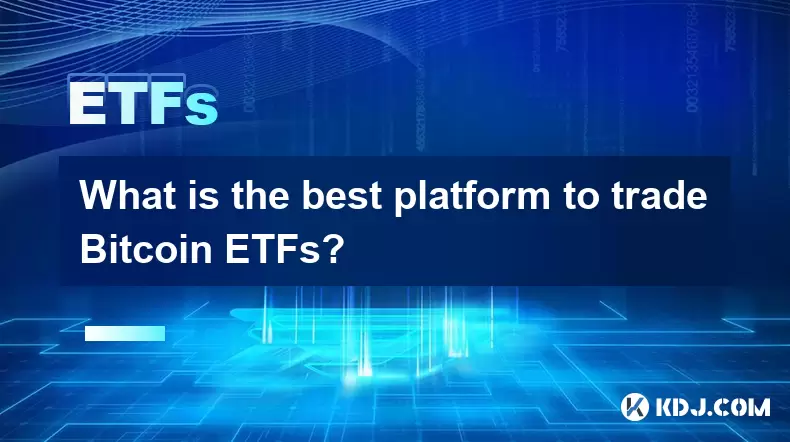
What is the best platform to trade Bitcoin ETFs?
Jul 23,2025 at 04:14am
Understanding Bitcoin ETFs and Their Role in TradingBitcoin Exchange-Traded Funds (ETFs) have gained significant traction among traditional and crypto...
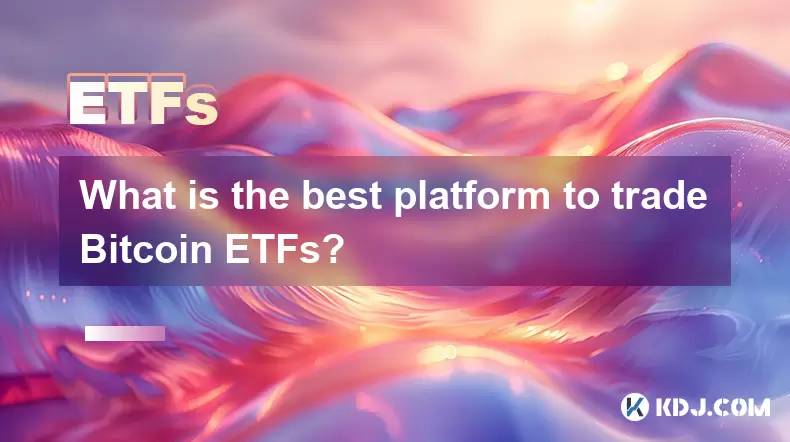
What is the best platform to trade Bitcoin ETFs?
Jul 17,2025 at 03:50pm
Understanding Bitcoin ETFs and Their Role in the MarketBitcoin Exchange-Traded Funds (ETFs) are investment vehicles that track the price of Bitcoin wi...
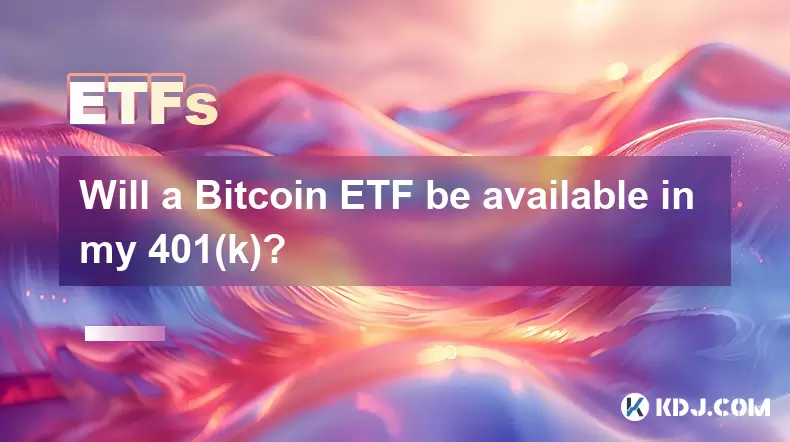
Will a Bitcoin ETF be available in my 401(k)?
Jul 17,2025 at 10:42pm
What is a Bitcoin ETF?A Bitcoin ETF (Exchange-Traded Fund) is an investment vehicle that tracks the price of Bitcoin without requiring investors to di...
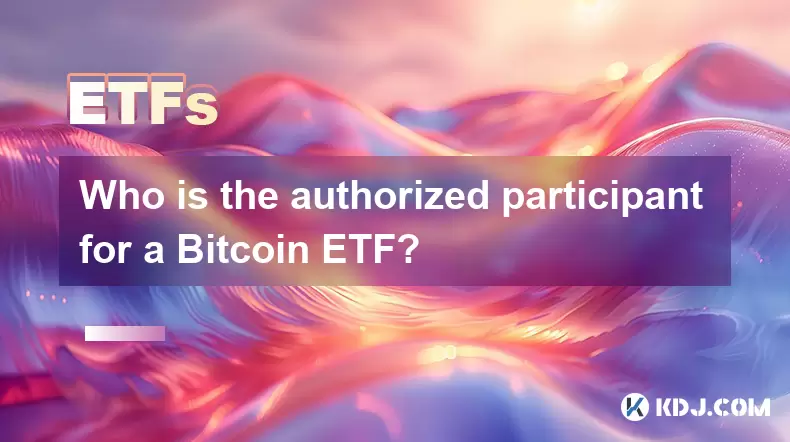
Who is the authorized participant for a Bitcoin ETF?
Jul 18,2025 at 12:42am
Understanding the Role of Authorized Participants in Bitcoin ETFsIn the context of Bitcoin Exchange-Traded Funds (ETFs), an authorized participant (AP...
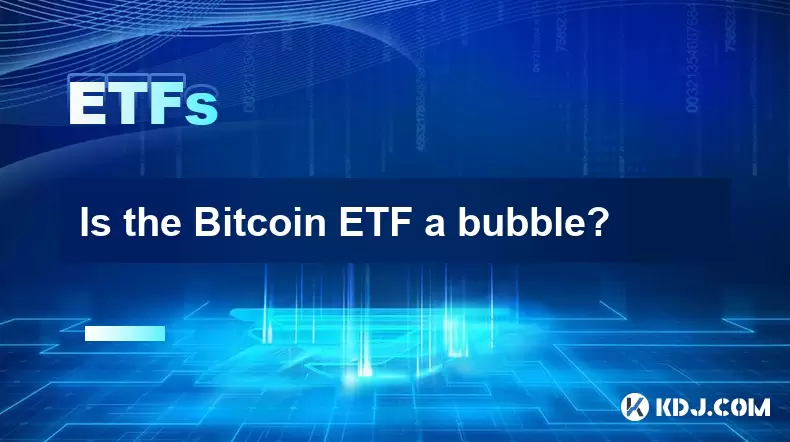
Is the Bitcoin ETF a bubble?
Jul 20,2025 at 06:57am
Understanding the Bitcoin ETF ConceptA Bitcoin Exchange-Traded Fund (ETF) is a financial product that aims to track the price of Bitcoin without requi...
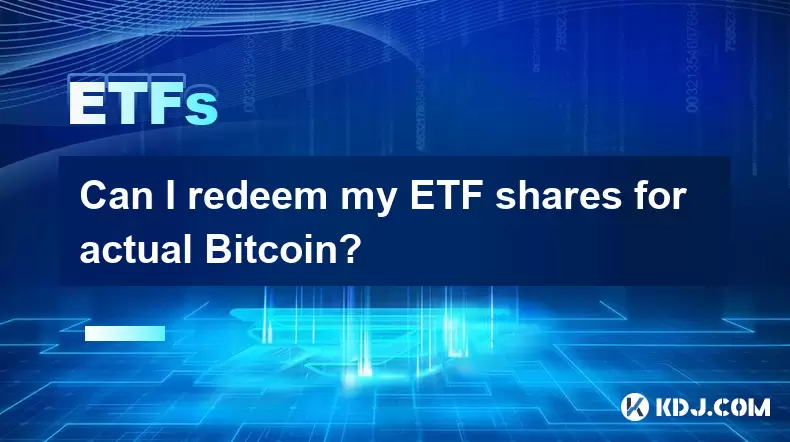
Can I redeem my ETF shares for actual Bitcoin?
Jul 17,2025 at 03:14pm
Understanding ETF Shares and Their Relation to BitcoinExchange-Traded Funds (ETFs) have become a popular investment vehicle for those looking to gain ...

What is the best platform to trade Bitcoin ETFs?
Jul 23,2025 at 04:14am
Understanding Bitcoin ETFs and Their Role in TradingBitcoin Exchange-Traded Funds (ETFs) have gained significant traction among traditional and crypto...

What is the best platform to trade Bitcoin ETFs?
Jul 17,2025 at 03:50pm
Understanding Bitcoin ETFs and Their Role in the MarketBitcoin Exchange-Traded Funds (ETFs) are investment vehicles that track the price of Bitcoin wi...

Will a Bitcoin ETF be available in my 401(k)?
Jul 17,2025 at 10:42pm
What is a Bitcoin ETF?A Bitcoin ETF (Exchange-Traded Fund) is an investment vehicle that tracks the price of Bitcoin without requiring investors to di...

Who is the authorized participant for a Bitcoin ETF?
Jul 18,2025 at 12:42am
Understanding the Role of Authorized Participants in Bitcoin ETFsIn the context of Bitcoin Exchange-Traded Funds (ETFs), an authorized participant (AP...

Is the Bitcoin ETF a bubble?
Jul 20,2025 at 06:57am
Understanding the Bitcoin ETF ConceptA Bitcoin Exchange-Traded Fund (ETF) is a financial product that aims to track the price of Bitcoin without requi...

Can I redeem my ETF shares for actual Bitcoin?
Jul 17,2025 at 03:14pm
Understanding ETF Shares and Their Relation to BitcoinExchange-Traded Funds (ETFs) have become a popular investment vehicle for those looking to gain ...
See all articles

























































































